The Checker Maven
The World's Most Widely Read Checkers and Draughts Publication
Bob Newell, Editor-in-Chief
Published every Saturday morning in Honolulu, Hawai`i
Noticing missing images? An explanation is here.
Rebound
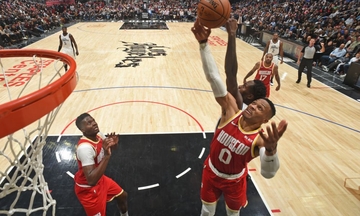
Rebound. With the literal meaning of "bouncing back" the term applies to a number of things. There's the rebound in basketball. Someone recovering from an injury or illness can be said to be "on the rebound." And of course there's always the "rebound romance."
"Rebound" is an apt title for today's Checker School column. You'll see why when you solve it.
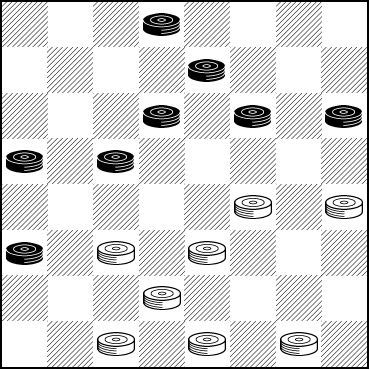
WHITE
White to Play and Win
W:W19,20,22,23,26,30,31,32:B2,7,10,11,12,13,14,21
This one is probably around medium in difficulty. You may not get it on the first try, but we're sure you'll "rebound" from any such small setbacks and find the solution. When you've either figured it out or bounced around enough, click on Read More to bound over all barriers and see how it's done.![]()
Host Migration Completed

We've just completed a transfer of our website hosting to a new hosting company. The old company, one we've been with for nearly 20 years, regrettably has suffered a deterioration in reliability and responsiveness. These things, combined with ever-increasing costs, told us it was unfortunately time to move on.
The transition was both expensive and time-consuming, occupying several marathon days and nights. We're still not certain that everything is back to 100% operation, so if you notice anything that seems wrong, please let us know. However, we're hoping for smooth sailing from here on out.![]()
Easy April
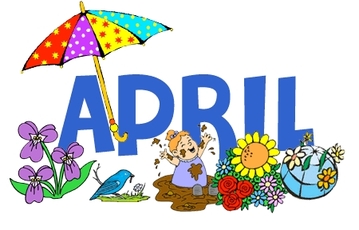
April. For much of North America, winter is coming to an end. There's more daylight. Compared to the winter months, it's an easy month. Well, mostly. In both the US and Canada, income tax returns come due. Kind of spoils the "easy" theme, doesn't it?
On the checker front, though, we'd like to ease into April, even if April isn't completely easy. Here's a speed problem sent to us by regular contributors Lloyd and Josh Gordon of Toronto. It's very much on the easy side. An experienced player will solve it in a few seconds; a beginner might take a little longer, but not a lot. At the Checker Maven we try to provide something for everyone.
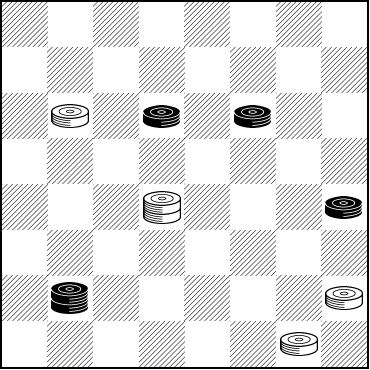
WHITE
White to Play and Win
W:W32,28,9,K18:B20,11,10,K25
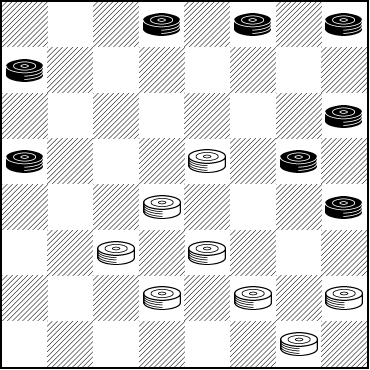
WHITE
White to Play and Win
W:W15,18,22,23,26,27,28,32:B2,3,4,5,12,13,16,20
Black has just played 1-5, whereas 1-6 or a couple of other moves would have held a narrow draw. Yes, this certainly looks like a White win, but it's a good exercise in application of technique to work out how it's done. Not nearly as easy as our first problem, but straightforward enough.
An easy start to April, or a harder one? You be the judge. Solve the problems and then it's easy enough to click on Read More to check your solutions.![]()
Beacon Cafe: The Challenge
Sal Westerman had gotten another letter from North Dakota State University Professor Don Steam, who was the leader of Fargo's Let's Have Another Cup of Coffee, Let's Have Another Piece of Pie Checker Club.
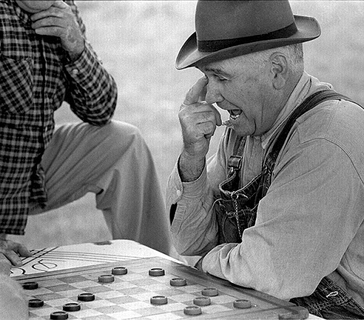
Don Steam
Recall that Sal's club, the Coffee and Cake Checker Club, which met at the Beacon Cafe in Bismarck, had exchanged checker problems with the Fargo club. Each club managed to solve the problem sent by the other club, and the score was even.
It was a Saturday afternoon in March, 1955, and Sal and the "boys"--- none younger than 50--- were having their regular weekly meeting. Once again Sal was indignantly waving Don's latest letter about.
"Read it to us, Sal," said Dan, who along with Mike, Louie, Wayne, Delmer, and Larry made up the day's contingent.
Sal cleared his throat. "Dear Mr. Westerman, frankly we're surprised you were able to solve the problem we sent you. Maybe you aren't quite as bad as we thought you were. Or maybe you are and just got lucky. Well, with the score even, we propose that you come to Fargo for a match. Five boards, two games per board, go-as-you-please. We're giving you a break there, as we doubt you can handle three-move ballot. Match to take place in April. Prize five dollars per point. The loser pays the difference in scores to the winner. Will you show up and play, or are you all a bunch of chickens? Sincerely yours, Dr. Donald Steam."
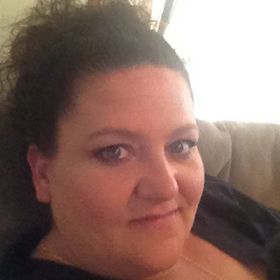
Deana Nagel
Deana, the proprietor of the Beacon Cafe and the best baker anyone had ever met, gave a low whistle. "Five bucks a point? These Fargo guys must be loaded!"
"What should we do, boys?" Sal said. "The weather's usually a little better in April and driving to Fargo might be okay. But do we want to?"
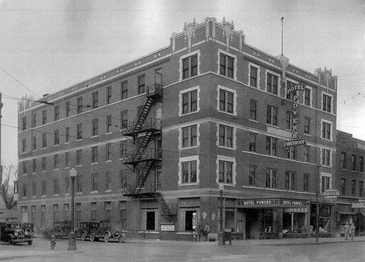
The Home of the Fargo Club
"We sure do," Wayne said. "And we need to clean their clocks. Arrogant bunch."
Everyone nodded in agreement, although Dan said, "Can we afford it? What if we lose and have to pay them? A shutout would cost us a hundred bucks."
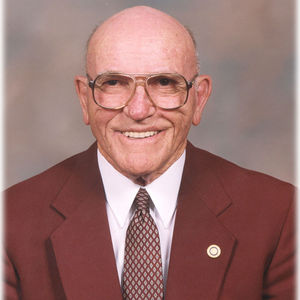
Mayor Lips
"We'll get sponsorship," Sal said. "I'll talk to the Mayor. He'll put up a stake for us." Mayor Evan Lips was a good friend of Sal's and could be relied on for support. "He might even cover our gas and lodging." Sal paused a moment. "But we better start practicing. Let's begin with a problem Ed sent me." Ed was Sal's checker pen-pal in Pennsylvania.
With perfect timing, Deana called out, "You boys are going to need some refreshments. I've got peanut butter bars today, fresh and hot."
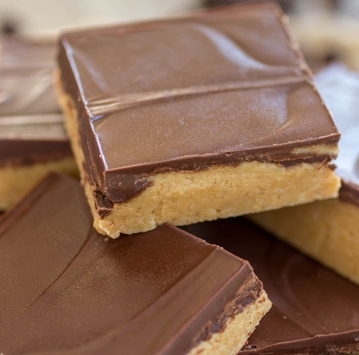
Everyone smiled. "I'll buy today," Wayne said. "Deana, we'll need a dozen bars at least, and a lot more coffee!"
The boys began work on the following position.
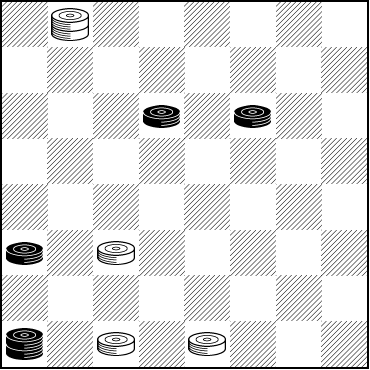
WHITE
White to Play and Win
W:B10,11,21,K29:W22,30,31,K1
After an hour, Delmer said, "Gosh, if we can't get this one, how are we going to beat ..."
"Hey wow man, you gotta think positive," Louie interrupted. "Here, have another bar and get back to work." Louie passed Delmer the now nearly empty plate of peanut butter bars, and the boys continued to study the position.
How would you train for a big, important match? Certainly solving some problems would be part of the program. See how you do and then click on Read More to see the solution and the rest of the story.![]()
18 Wheeler
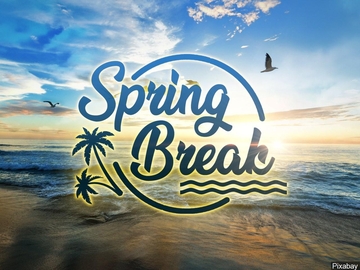
It was spring break, and according to longstanding tradition, the National Checker League observed a weeklong holiday.

Marvin J. Mavin
Marvin J. Mavin, the superstar Captain of the Detroit Doublejumpers, wanted to do something with his long-time girlfriend, Priscilla Snelson. But Priscilla, as a C-level executive at Rust Belt Holdings, was to be the keynote speaker at a conference in Turkmenistan, and she would be away from home during Spring Break.

That left Marvin on his own, and he decided to go on a road trip in his trusty if aging Volkswagen. It was something he did every so often; head off with no particular destination in mind, stopping over at cheap motels and eating in roadside diners and truck stops. He said it cleared his head. Of course he always stopped somewhere close to a dive bar where he could enjoy a couple of his favorite brews.

Somewhere in southern Indiana, Marvin pulled in at the Chuckie Checkers Truck Stop. He had read about it in his automotive travel guide; it was said to be a place where truckers who were checker fans (and what red-blooded trucker wasn't) liked to stop for a couple of informal games along with good food and coffee. Marvin put on his sunglasses and pork-pie hat in an attempt to go incognito. Often, it worked. But not always.
As he expected, the place was filled with truckers, families on vacation, and a few businessmen. Quite a few of the truckers had skittles games going while they ate their dinners and drank their coffee.
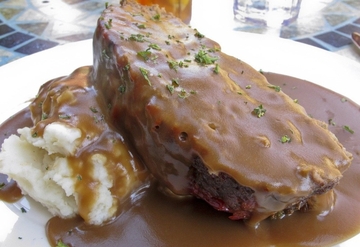
Marvin found an open seat at the gleaming chrome wraparound counter. A friendly waitress suggested the Trucker Special, a large slice of meat loaf served with mashed potatoes and gravy and peas and carrots. She brought him coffee right away; even Marvin knew better than to ask for beer in a roadside eatery.
While he sipped his coffee, Marvin took a look around. There was a large video display with a checker position shown on it. The position was titled "18 wheeler" and looked like the diagram below.
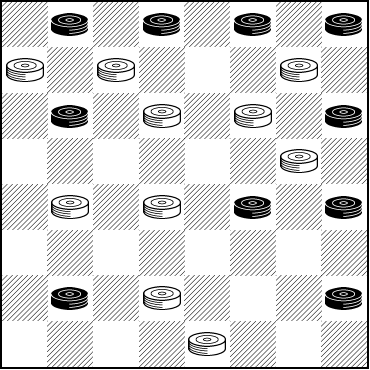
WHITE
White to Play and Win
W:W5,6,8,10,11,16,17,18,26,31:B1,2,3,4,9,12,19,20,25,28
Sitting to the left of Marvin was a fellow who was obviously a trucker. He noticed Marvin's intent gaze at the display, and remarked, "Some guy Brian down in Missouri named that one for us. You know, 18-wheelers, the rigs we drive."
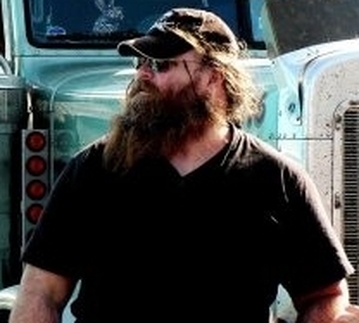
"You don't say, good buddy," Marvin replied. He knew about 18-wheelers and had learned some CB radio talk in a younger day. "Ten-four on that one!" Marvin grinned.
But the trucker didn't. "Hey, you makin' fun of me?" he asked.
Marvin couldn't miss the rather menacing look on the trucker's face. "Uh, no, I was just, like, trying to talk your lingo ..."
"That stuff went out thirty years ago, and you ain't even hardly that old," the trucker said. "What, you think all of us are hams? Hey, in high school I played for the school team. I was pretty good too. Ha! I know. You're one of them hams yourself. Probably couldn't even win two kings against one. Well, smart guy, hows about a little bet?"
Marvin swallowed hard. "What kind of bet?"

"You show how to win that 18-wheeler up there, I buy your dinner. You don't get it, you buy mine. And I won't make you apologize neither for gettin' my dander up if you be a sport and take my bet."
"And if I don't?" The moment he said it, Marvin regretted it.
"You don't wanna find out, 'good buddy.'" The trucker snorted. "Now what'll it be?"
Just then, the waitress brought Marvin his Trucker Special.
"Er ... you're on? After I eat?"
The trucker snatched away Marvin's plate and set it off to the side.
"Work before play. Hey, you shoulda ordered the Ham Special! Now get goin'. You got five minutes to solve it, just like anybody else."
We should point out to those readers not familiar with Willie Ryan's publications that "ham" is the name he gave to lesser players. We'd surely never call one of our readers a "ham"; we'd just prefer to say "improving player." But regardless of that, can you wheel out the solution? Truck right along and then click on Read More to see how it's done and read the conclusion of our story.![]()
Jumpin' Jehoshaphat
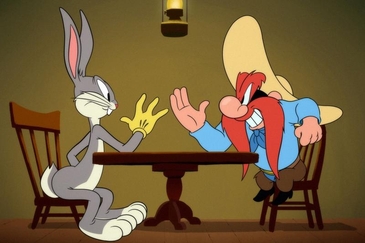
Yosemite Sam, the arch-enemy of Bugs Bunny, is famously known to exclaim, "Jumpin' Jehoshaphat!" but it's not likely that the said toon character was aware of the origins of this expression.
Indeed, there isn't a lot known about the phrase, except that it first appeared in print in 1866 and is thought to be part of the 19th century predilection for "minced oaths" which embodied a strong expression of feeling without actually using potentially offensive words. Other efforts to relate the expression to the biblical Jehoshaphat seem to us to be somewhat forced.
In today's Checker School column, taken from Andrew J. Banks' unusual and instructive book, Checker Board Strategy, we meet a "Jumpin' Jehoshaphat" checker problem. You'll see what we mean when you solve it.
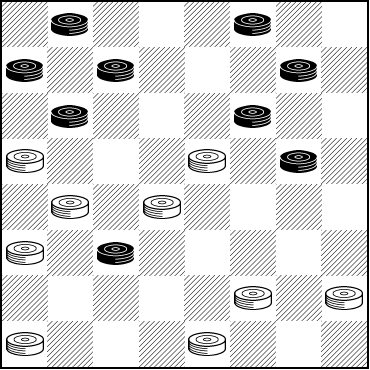
WHITE
White to Play and Win
W:W13,15,17,18,21,27,28,29,31:B1,3,5,6,8,9,11,16,22
Jump to it! Solve the problem and then jump your mouse over to Read More to verify your solution.![]()
Relatively Easy; A Speed Problem
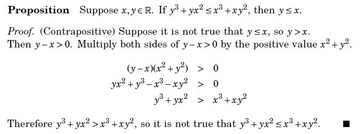
What's easy for some isn't quite so easy for others. The math above is quite simple if you happen to be a Ph.D. mathematician. If you struggle with high school algebra, you may not find it all that easy.
Regular contributors Lloyd and Josh Gordon sent us a checker problem which illustrates this concept rather well. Take a look at the diagram below.
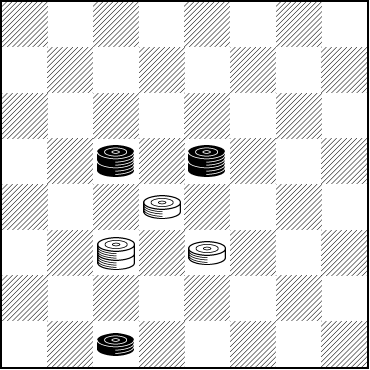
BLACK
Black to Play and Win
B:W10,K11,15:B3,K18,K19
Is this problem easy? For a player with a little experience, it's pretty straightforward. For a novice, it might be harder and take a little more effort. While we're calling it a "speed problem" we won't specify a time limit. Solve it as quickly as you can.
What's easy for anyone, though, is clicking on Read More to see the solution.
[Read More]Getting Even

Marvin J. Mavin
Marvin J. Mavin, professional checkers superstar and Captain of the World Champion Detroit Doublejumpers, had gotten himself into serious trouble with his long-time girlfriend, corporate executive Priscilla Snelson.
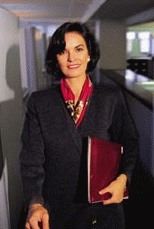
Priscilla Snelson
At her swank New Year's Eve party, Marvin had responded in what Priscilla felt to be an inappropriate manner to the advances of the Hollywood starlet known as Suzette Slinky. Priscilla threw both Suzette and Marvin out of her condo, and it was more than two weeks before Priscilla would even answer Marvin's phone calls.
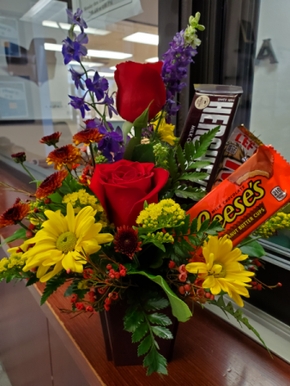
Marvin, of course, apologized profusely. He sent candy and flowers and his own homespun version of love notes. He even considered taking out newspaper ads asking for forgiveness. But in the end, Priscilla came up with an alternative.
"If you want to get back in my good graces," she told Marvin during a tense phone call, "you'll do what I ask."
Priscilla told Marvin was to appear at the Annual Meeting of the Women's Entrepreneur Network Communal Help (WENCH), a non-profit of which Priscilla was President. The theme of this year's meeting was "How Women Can Be Equal Partners in Professional Sports."
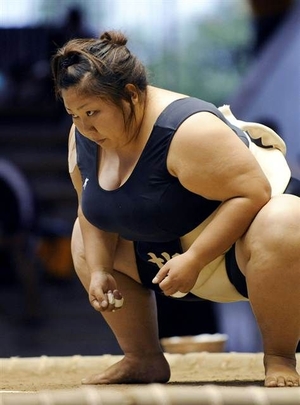
Yuko Hashimoto
But it was hardly as simple as just making an appearance. Priscilla, who had connections in very high places, arranged for Marvin to play a match with a rising Japanese checker star, Yuko Hashimoto. However, there was more to this than met the eye, though Priscilla wasn't letting on as to the full content of her plan.
Now, recall that Marvin had recently gone on trial for Misogynistic Microaggression Offending and Improper Gender Address in the court of the National Checker Federation. While Marvin won the case, most people thought it had been on a mere technicality and that Marvin had actually been in the wrong.
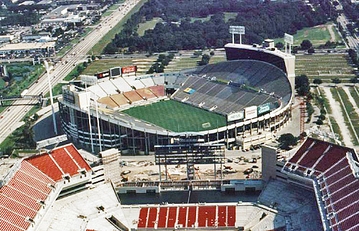
Tampa Checkerdrome
When Marvin appeared on the field in the Tampa Checkerdrome in front of 25,000 members of WENCH, he was greeted by a chorus of boos, jeers, and catcalls. Priscilla had told him what to expect, but Marvin was still taken aback.
"Aw, gee, folks," he said, being careful not to use the word 'ladies', "I ain't that bad."
This only made things worse. But when Yuko Hashimoto took the field, the booing subsided and was replaced by loud cheers and thunderous applause.
Marvin took a look at Yuko as she shook hands with him and then sat at the checkerboard. He was about to say something, but uncharacteristically thought better of it, and then the huge crowded hushed as the match began.
It was a tensely fought contest, and Marvin soon realized he was up against a top contender in Yuko. Finally, Marvin got what he felt to be a bit of and advantage, and thought he had a chance to win.
Marvin looked over at Yuko. He started to say, "Betcha can't ..." but the words caught in his throat as he pictured Priscilla glaring at him from her 50 yard line seat.
The position was as follows. Yuko was playing the White pieces.
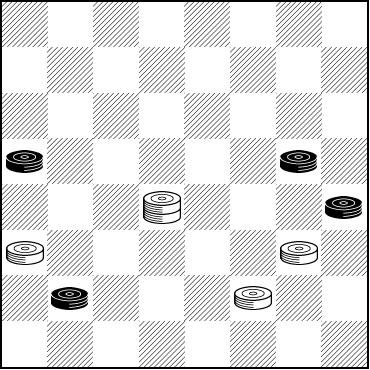
WHITE
White to Play and Draw
W:W21,24,27,K18:B13,16,20,25
Several minutes passed, with Yuko's gaze focused intently on the board. Then she looked up at Marvin. Her expression gave Marvin the shivers. Yuko didn't say a word and simply made her move.
Could you pull off a draw in this situation? Do you have Yuko's calm disposition and steady nerves?
This problem was sent to us specifically for this story by master problem composer Brian Hinkle. As our regular readers know, this means it will be a fine problem but not an easy one. The problem is Brian's modification of a correction to Ben Boland, as found by Jim Loy using the KingsRow engine.
When you're ready, click on Read More for the solution and the conclusion of our story.![]()
Beacon Cafe: Challenge Returned
"They solved it," Sal Westerman said, with obvious distaste. "They solved Ed's 'Kaleidoscope' problem. Now they say we owe them, and not only that, they sent us one in return."
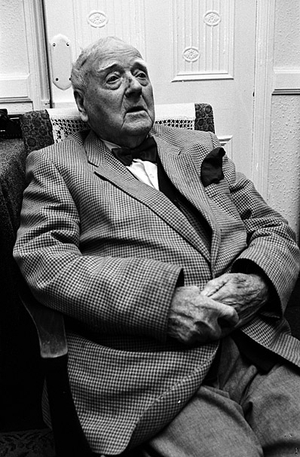
Sal Westerman
It was a Saturday afternoon in February, 1955, and the "boys" (who were all over 50 years old) were gathering as they always did in the Beacon Cafe in Bismarck, North Dakota. It was a blustery day, snow mixed with rain and an iron-gray sky, and Sal thought the weather suited his mood.
Sal was the unofficial leader of the Coffee and Cake Checker Club, which had been meeting at the Beacon for years. Recently, what Sal referred to as an "upstart" club had sprung up in Fargo (see previous Checker Maven story). They called themselves "Let's Have Another Cup of Coffee, Let's Have Another Piece of Pie" and they had challenged Sal's club to a checker problem solving contest. Sal sent them his Pennsylvania pen-pal's "Kaleidoscope" composition, and Don Steam, the Fargo club leader and a professor at North Dakota State University, soon afterwards sent Sal a letter in reply.

Don Steam
"Listen to what this character told me," Sal said. He was waving Professor Steam's letter around. "'Send us something challenging next time. Something worthy of our skills. The solution to your trivial problem is below, along with one for your club to solve. Which you won't, because you haven't got the chops."
There were mutterings around the table in the big booth at the back of the Cafe. Larry, Dan, Wayne, Delmer, and Louie were on hand today. "Pretty rude and arrogant," Delmer said.
"And not only that," Sal exclaimed, "they sent us a problem composed by Brian in St. Louis! I thought Brian was my pen-pal, but he's been two-timing us!"
"Easy now, Sal," Larry said. "Brian is a nationally famous grandmaster problemist. He probably corresponds with lots of people."
Sal shuffled a little in his seat. "I suppose," he said, "but does it have to be that bunch of scoundrels?"
"Let's see it," Wayne said. "We better get it. We all ready owe them for one round of coffee and pie."
"Yes, and this Steam character told me to send him five bucks," Sal said. "Imagine!"
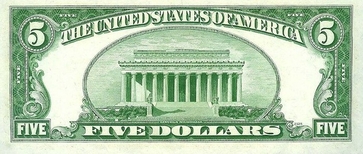
There was a low whistle from behind Deana's counter. Deana was the proprietor and a championship baker. She sold coffee for ten cents and her bars were two for a quarter. "Five bucks! Are there forty of them or something?" she asked. "But hey, I've got cherry granola bars today!"

"Sure thing," Sal said. "I'll buy a dozen. The boys need to be fueled up so they can crack this one."
"Thanks, Sal!" Wayne said, and the others added their agreement. "Now let's get at it!"
Sal laid out the following position on one of the checkerboards.
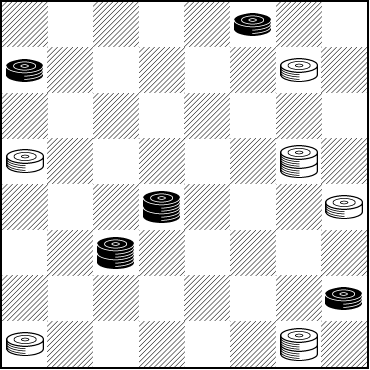
WHITE
White to Play and Win
W:W8,13,K16,20,29,K32:B3,5,K18,K22,28
"No time limit today, boys," he said. "We just have to solve it."
A large platter of bars and a fresh pot of coffee arrived at the table. The boys dug in while talking over the problem.
Would you be able to handle Professor Steam's--- or should we really say Brian's--- challenging problem? Another fiver is on the line, and in 1955 that represented a significant amount (almost $50 in today's terms). You too can take as long as you want and indulge in your favorite snack. When you're ready, click on Read More to see the solution and the rest of the story.
[Read More]Rebooting Checkers

Checkers is in need of a reboot. That's the opinion of Australian Richard Torning, and he has some original ideas about how to go about it.
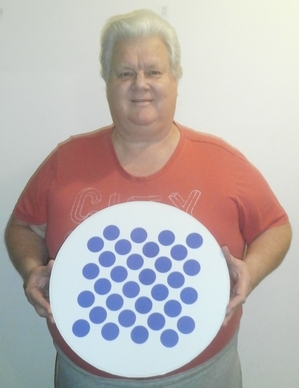
Richard Torning and "Roundsquare" Board
We can't argue with Mr. Torning's major premise. The fortunes of our game of checkers have been declining since the 1950s, when television became a big thing. You've heard it all before, about how the public considers checkers a game for kids and old men; that someone is playing "checkers" instead of "chess" when they need to up their game and move to a higher level; and the list goes on.
Mr. Torning wants to make the game more appealing, and to do so he's revived and modernized an idea that actually goes back more than 100 years but never really caught on: the "roundsquare" board. But instead of trying to fit a square peg into a round hole (or vice-versa), he's instead "circling the square" and the new board is just one part of a multi-pronged approach.
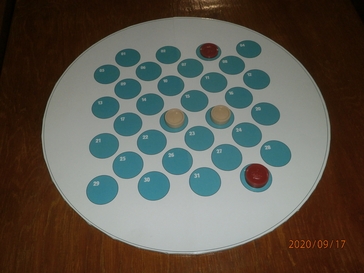
Numbered "Roundsquare" Board
We did an an-depth interview with Mr. Torning. You can read it all by clicking on Read More, just below the problem solution (please solve the problem first!), and we think you should. Mr. Torning has an insightful and appealing message for us. Not for him is yet another "modern" variant of the game that inevitably detracts rather than adds. His ideas are practical and cogent.
For one thing, he'd like to see a fresh start with the game renamed, and the name depending upon the language and usage of a particular area. He suggests Checkers-32 in the United States, Draughts-32 elsewhere in the English-speaking world, and so on, even going so far as to suggest a series of meaningful names to use among Aboriginal groups in Australia.
Of the "roundsquare" board, he says this: "The aim is to keep a minimalist approach to the game by further eliminating the 32 superfluous squares on the board but retaining the rules and shape of the two pieces. Instead of limiting the game to red/white or black/red pieces there is a need to make the game colorful, attractive, eye-catching, and simple to understand."
Mr. Torning's prototype boards are indeed very colorful and attractive and instantly attract attention. He also points out that using this board would uniquely differentiate our version of checkers from all others, and especially distance the game from chess.
Again, we urge you to read Mr. Torning's full remarks. He has also provided an interesting booklet, Early Australian Draughts Games, which you can download here.
The Draughts-32 idea is currently being prototyped at Minimbah Aboriginal School in Australia. Mr. Torning hopes to spread it far and wide and asks for your support by trying out the new board and the new ideas in your own checker playing community, and then becoming an ambassador.
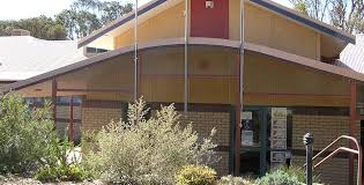
Building at Minimbah School
We can only wish Mr. Torning much success. Surely we would all like to see checkers have a vibrant and exciting future. Mr. Torning is working to make that happen.
And now, to "round" out today's column and "square" all accounts, here's a checker problem presented on a roundsquare board.
BLACK
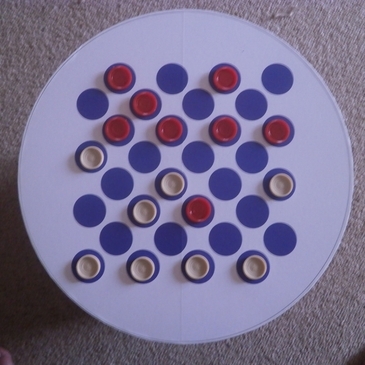
WHITE
White to Play and Win
W:W13,18,20,22,29,30,31,32:B1,3,6,9,10,11,12,23
See if you can get "round" to solving it, after which you can "square"-ly click your mouse on Read More to see the solution.![]()
The Checker Maven is produced at editorial offices in Honolulu, Hawai`i, as a completely non-commercial public service from which no profit is obtained or sought. Original material is Copyright © 2004-2025 Avi Gobbler Publishing. Other material is public domain, as attributed, or licensed under Creative Commons. Information presented on this site is offered as-is, at no cost, and bears no express or implied warranty as to accuracy or usability. You agree that you use such information entirely at your own risk. No liabilities of any kind under any legal theory whatsoever are accepted. The Checker Maven is dedicated to the memory of Mr. Bob Newell, Sr.

